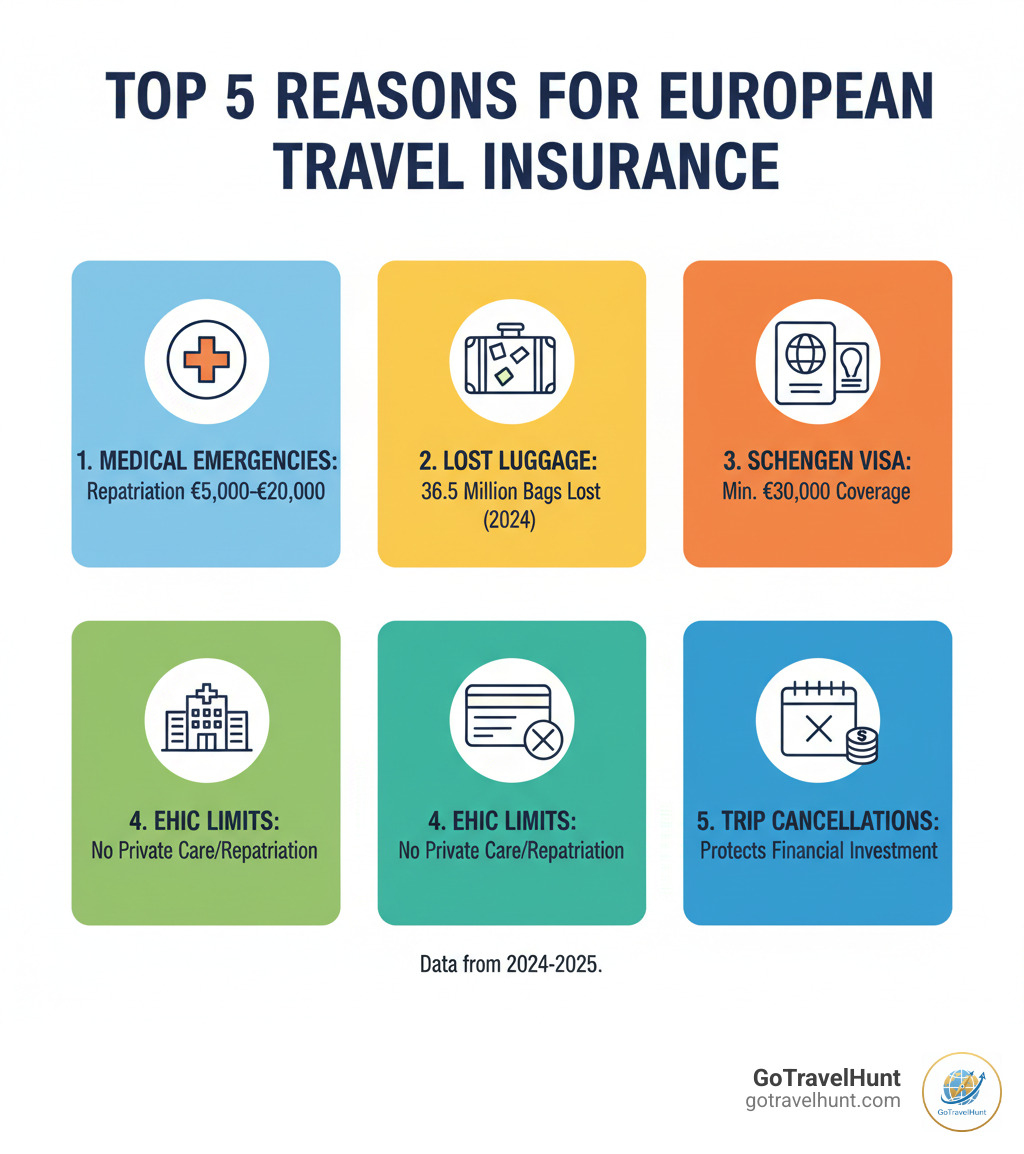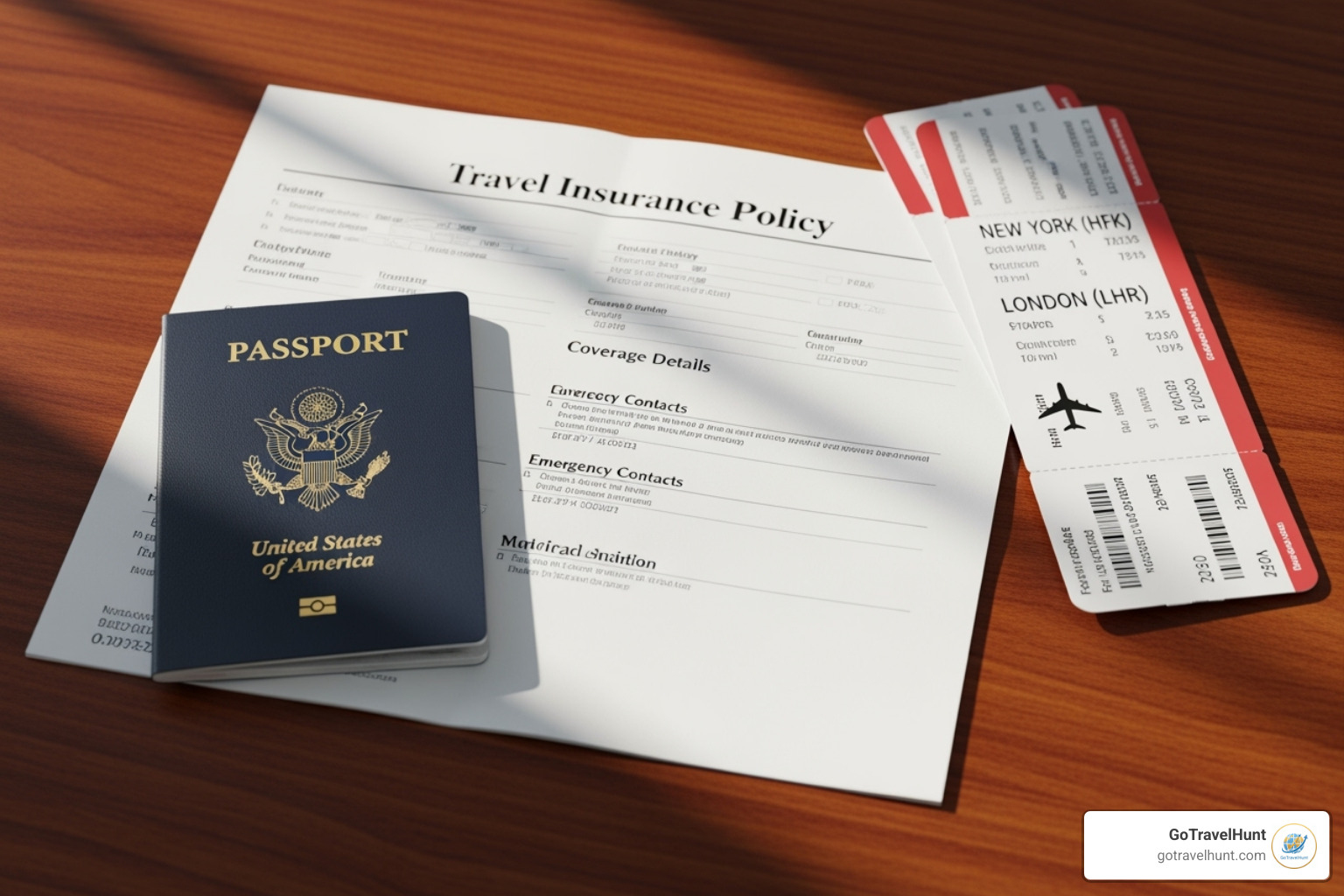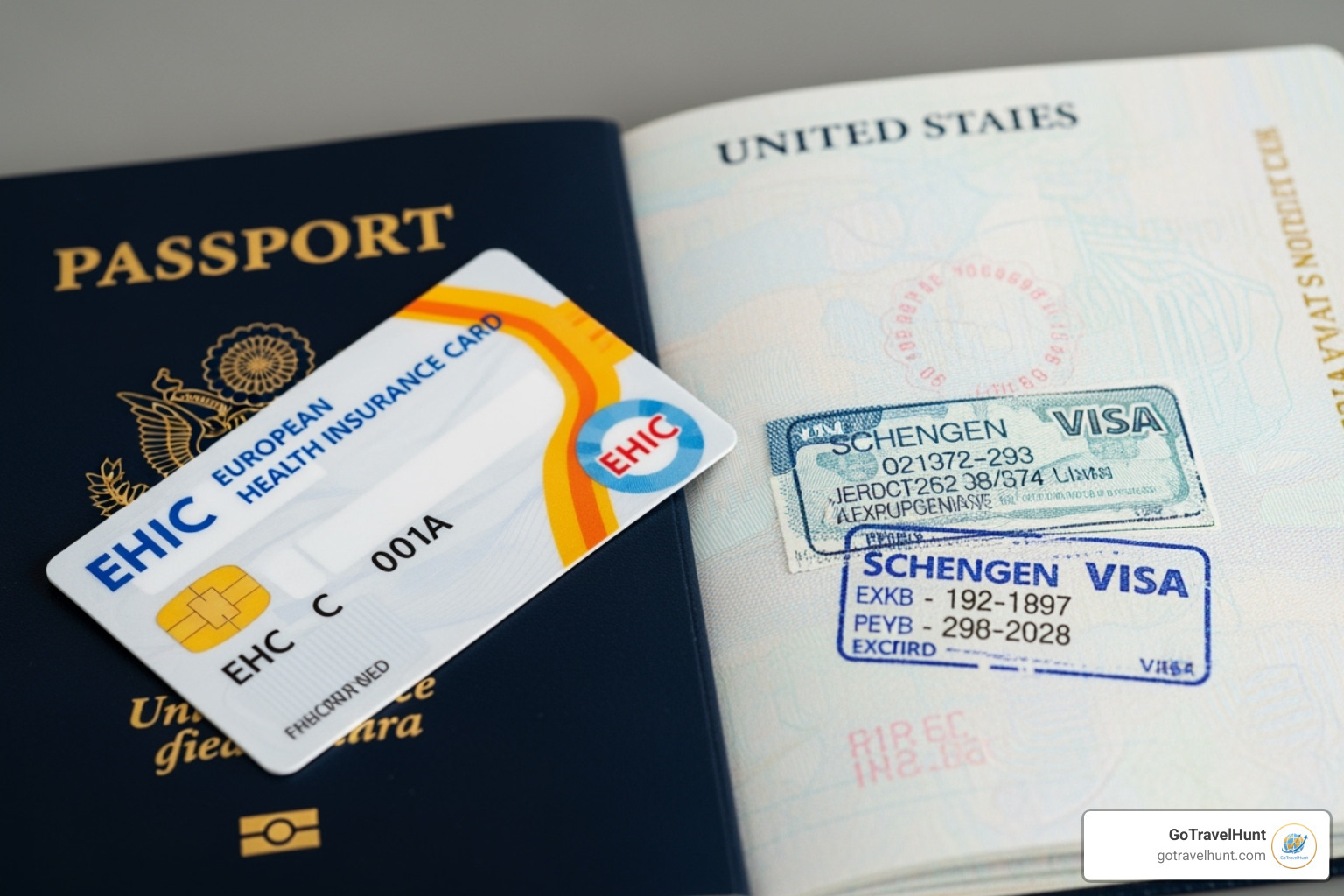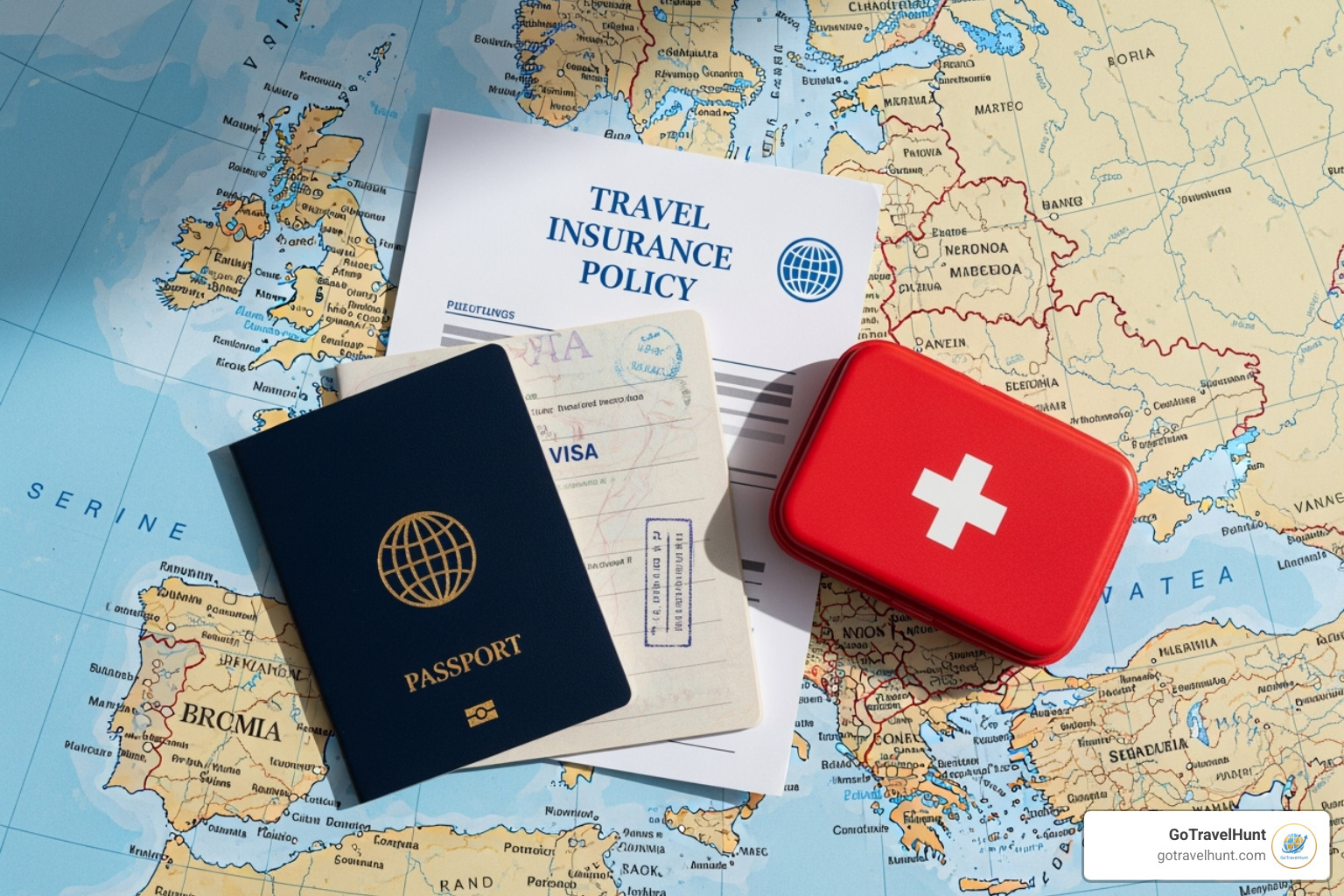Why You Can’t Afford to Skip European Travel Insurance
European travel insurance is essential protection for your trip abroad. It covers medical emergencies, trip cancellations, and lost baggage, protecting you from unexpected costs that could reach tens of thousands of euros. Here’s a quick overview of what it covers:
- Medical emergencies up to 100,000-250,000 EUR
- Medical repatriation (average cost: 5,000-20,000 EUR)
- Trip cancellation/interruption for covered reasons
- Lost or delayed baggage (36.5 million bags were mishandled in 2024)
- 24/7 emergency assistance and personal liability coverage
- Schengen visa compliance (minimum 30,000 EUR coverage required)
Planning a European adventure should be exciting, not stressful. However, a medical emergency, cancelled flight, or lost luggage can turn your dream vacation into a financial nightmare. Medical repatriation alone can cost between 5,000 and 20,000 EUR, an expense that could be devastating for most travelers.
Many travelers mistakenly believe their home health plan or credit card offers adequate coverage, but most policies have significant gaps. Similarly, the European Health Insurance Card (EHIC) only covers basic state healthcare—it won’t cover private care, repatriation, or non-medical issues like trip cancellations. Over 235 million Europeans have an EHIC, but it is not a substitute for travel insurance.
I’m Ramy Saber, founder of GoTravelHunt. Through extensive travel and managing international projects, I’ve learned how critical proper european travel insurance is for protecting your finances and peace of mind. This guide will walk you through choosing the right coverage for your trip.

Understanding Your European Travel Insurance Coverage

Think of european travel insurance as your financial safety net. A policy is a bundle of protections, and understand its key components: policy limits (the maximum payout), deductibles (your out-of-pocket share), and exclusions (what isn’t covered). Reviewing these before you travel helps avoid surprises during an emergency.
What medical coverage is essential?
Medical emergencies are rare but can be financially devastating. A solid european travel insurance policy is built on this coverage.
-
Emergency medical expenses: This covers doctor visits, hospital stays, and prescriptions for unexpected illnesses or injuries. Policies typically offer between 100,000 and 250,000 EUR, which is necessary as private medical care in Europe can be very expensive.
-
Medical repatriation: This is critical. If you need specialized transport to return home for treatment, the costs can be staggering, typically ranging from 5,000 to 20,000 EUR. Without insurance, this could ruin you financially.
-
Emergency dental care: A sudden toothache or dental injury can be painful and costly. Look for policies that include a reasonable limit for dental emergencies.
-
24/7 assistance: In a crisis, having a round-the-clock emergency hotline is invaluable. They can help you find medical facilities, arrange billing, and coordinate your care or repatriation, turning a potential nightmare into a manageable situation.
Key non-medical coverages for european travel insurance
A comprehensive european travel insurance policy also protects your financial investment in the trip.
-
Trip cancellation and interruption: This coverage reimburses you for non-refundable flights, hotels, and tours if you must cancel or cut your trip short for a covered reason (like a serious illness or death in the family). This is especially important for expensive trips like amazing city breaks in Europe.
-
Lost or delayed baggage: With airlines mishandling 36.5 million bags in 2024, this coverage is essential. It compensates you for lost items and allows you to buy necessities if your bags are delayed. For packing tips to minimize this risk, see our guide on best things to pack for international travel.
-
Travel delay: If your flight is significantly delayed, this coverage can reimburse you for unexpected meals and accommodation while you wait.
-
Personal liability: This protects you if you accidentally injure someone or damage their property. For instance, if you cause an accident while cycling during your short breaks in Belgium, this coverage could save you from a very expensive situation. For more trip ideas, explore our travel planning guides.
EHIC vs. Travel Insurance and Schengen Visa Rules

When planning a trip to Europe, it’s easy to get confused by terms like EHIC and Schengen visa rules. Let’s clarify what they mean for your insurance needs.
The Schengen Area includes 27 European countries with open internal borders, but this freedom comes with rules, especially regarding insurance.
The European Health Insurance Card (EHIC): What it is and isn’t
Around 235 million Europeans carry an EHIC, which grants access to state-provided healthcare in other EU countries (plus Iceland, Liechtenstein, Norway, Switzerland, and the UK) at the same cost as a local resident. It’s useful for basic care and pre-existing conditions.
However, the EHIC is not a travel insurance alternative. Here’s what it doesn’t cover:
- Private healthcare: You’ll pay out-of-pocket for any private medical treatment.
- Repatriation: It offers no coverage for the high cost (5,000 to 20,000 EUR) of getting you home if you’re seriously ill.
- Non-medical issues: It won’t help with cancelled flights, lost luggage, or personal liability.
For official details, visit the Official EHIC Information page. The bottom line: get an EHIC if you’re eligible, but always pair it with comprehensive european travel insurance.
Meeting Schengen Visa insurance requirements
If you’re a non-EU citizen who needs a Schengen visa, european travel insurance is mandatory. Your application will be rejected without it. The requirements are strict:
- Minimum coverage of 30,000 EUR for medical emergencies.
- Coverage for repatriation for medical reasons and in the event of death.
- Validity in all Schengen states for your entire trip duration.
You must submit an official insurance certificate with your visa application. Some providers even offer a refund if your visa is rejected.
Even if you don’t need a visa, travel insurance is crucial, as your home country’s health plan likely won’t cover you adequately abroad. Whether you’re planning amazing city breaks in Europe or short breaks in Belgium, proper insurance is your ticket to worry-free travel. For more preparation tips, see our More on international travel planning.
How to Choose the Right Policy for Your European Adventure

Choosing the right european travel insurance is about matching a policy to your specific trip. A weekend of short breaks in belgium requires different coverage than a month-long backpacking tour. Let’s break down how to find the right fit.
Factors that influence the cost of your policy
Your insurance premium is based on risk. Key factors include:
- Your age: Rates are generally lower for travelers under 50 and increase with age. Children are often covered for free or at a low cost on family plans.
- Your destination(s): Medical costs vary by country, which can affect your premium.
- Trip length: Longer trips cost more to insure because the risk window is larger.
- Coverage level: A basic medical-only policy is cheaper than a comprehensive plan. Expect to pay 5-10% of your trip cost for standard coverage.
- Deductible amount: A higher deductible (the amount you pay first) lowers your premium but increases your out-of-pocket cost if you make a claim. For more ways to save, see our Budget Travel tips.
Choosing the right european travel insurance for your trip
First, decide between a single-trip or multi-trip (annual) plan. If you travel three or more times a year, an annual policy is usually more cost-effective. Family plans are a smart choice when traveling with children, as they bundle everyone under one policy at a reduced rate.
Pay close attention to adventure sports coverage. Standard policies often exclude activities like skiing or mountain biking. You may need to add a rider or choose a specialized policy to cover these.
Finally, read the fine print. The policy documents detail exactly what is and isn’t covered. A few minutes of reading can save you thousands of euros.
| Feature | Basic Plan | Comprehensive Plan | Premium Plan |
|---|---|---|---|
| Medical Coverage | 30,000 – 60,000 EUR | 100,000 – 250,000 EUR | Up to 10,000,000 EUR |
| Repatriation | Included | Included | Included |
| Trip Cancellation | Limited, specific reasons | Good coverage, broader reasons | Extensive, includes “Cancel For Any Reason” |
| Trip Interruption | Limited | Good coverage | Extensive |
| Lost/Delayed Baggage | Low limits, basic delay compensation | Higher limits (1,000 EUR), better delay comp. | High limits (1,500+ EUR), includes valuable items |
| Travel Delay | Basic expenses | Meals, accommodation, transport | Extensive, higher daily limits |
| Personal Liability | Limited | Included | High limits (80,000+ EUR) |
| Adventure Sports | Excluded or optional add-on | Optional add-on | Often included for amateur sports |
| Pre-existing Conditions | Excluded or very limited | Optional, with stability period | Optional, broader acceptance |
| Schengen Visa Compliant | Yes (medical/repatriation) | Yes | Yes |
| Assistance | 24/7 hotline | 24/7 hotline, medical teleconsultation | 24/7 hotline, concierge services |
Pre-existing conditions and COVID-19 implications
Honesty is crucial here. You must declare any pre-existing medical conditions (like diabetes or asthma) to your insurer. Failure to do so is a primary reason claims are denied. Many policies require a “stability period” (e.g., 90-180 days) where your condition has been unchanged. If your condition isn’t stable, you may need a specialized policy.
The pandemic also changed travel insurance. Most european travel insurance policies now cover medical expenses if you contract COVID-19 during your trip. However, standard policies typically exclude cancellations due to pandemic fears or travel advisories.
For ultimate flexibility, consider “Cancel For Any Reason” (CFAR) coverage. It allows you to cancel for reasons not covered by standard policies. CFAR is expensive (adding ~50% to your premium), must be purchased within 7-21 days of your first trip payment, and typically reimburses only 50-75% of your non-refundable costs. Despite the limitations, it offers valuable peace of mind in an unpredictable world.
Making a Claim and What to Do in an Emergency
Knowing how to handle an emergency and make a claim on your european travel insurance can turn a crisis into a manageable hiccup. The golden rule is to contact your insurance provider immediately using their 24/7 emergency assistance hotline.
Before you travel, save your insurer’s emergency number in your phone and keep a physical copy in your wallet. For general emergencies in Europe, dial 112. Your insurer should be your first call in a non-life-threatening situation, especially for medical issues, as they can guide you to approved facilities and arrange direct billing.
Documentation is key to a successful claim. Keep everything organized.
-
For medical claims: Collect all medical reports, prescriptions, and original receipts for treatment and transport. Take photos of documents as a backup.
-
For lost or delayed baggage: Before leaving the airport, get a Property Irregularity Report (PIR) from the airline. This document is essential. Keep receipts for all necessary items you have to buy while waiting for your luggage.
-
For theft: File a report at the local police station immediately. Your claim will likely be denied without an official police report. Get a copy of the report before you leave.
-
For trip cancellation or interruption: You’ll need proof for the reason you had to cancel (e.g., a doctor’s note) and all original receipts for non-refundable expenses like flights and hotels.
Make it a habit to keep receipts for any potential claim-related expense. If you’re involved in an incident that could lead to a personal liability claim, do not admit fault. Contact your insurer for guidance before making any statements.
The purpose of european travel insurance is to provide support when you need it most. Following the correct process ensures you get the protection you paid for.
Frequently Asked Questions about European Travel Insurance
Here are answers to the most common questions we get at GoTravelHunt about european travel insurance.
When should I buy travel insurance for my European trip?
The best time is as soon as you book your trip. While you can buy medical-only coverage up to the last minute, purchasing insurance within 7-14 days of your first trip payment (like flights or a hotel) provides the most comprehensive protection, especially for trip cancellation.
This early window is also critical if you want to add “Cancel For Any Reason” (CFAR) coverage, as most insurers require it to be purchased within a week or two of your initial deposit. By buying early, you protect your investment from the moment you make it.
Does travel insurance cover train travel and tours within Europe?
Yes, a comprehensive european travel insurance policy typically covers prepaid and non-refundable train travel and tours. Here’s how:
- Trip Cancellation/Interruption: If you must cancel or cut your trip short for a covered reason, you can be reimbursed for the unused portion of your train tickets or tours.
- Travel Delays: If your train is significantly delayed due to a covered event (like a strike or mechanical failure), your policy can cover extra costs for meals and accommodation.
- Missed Connection: If a train delay causes you to miss a connecting flight or the start of a tour, many policies cover the costs to help you catch up.
Always check your policy details, but rest assured that whether you’re planning weekend trips in Belgium by rail or booking a multi-country tour, the right insurance has you covered.
Can I get a refund if my Schengen visa is rejected?
Yes, many reputable european travel insurance providers offer a full refund of your premium if your Schengen visa application is denied. This feature removes a layer of financial risk from the application process.
To get the refund, you typically need to submit the official rejection letter from the embassy or consulate to your insurance company. Since insurance is mandatory for a Schengen visa application (requiring at least 30,000 EUR in medical coverage), this guarantee is a valuable feature.
When shopping for a policy, look for this visa refusal clause in the terms and conditions or ask the provider directly to ensure you’re protected.
Conclusion: Travel with Confidence on Your Next European Getaway
Planning a European trip should be exciting, not stressful. European travel insurance is your financial safety net, protecting you from high-cost emergencies, lost luggage, and trip cancellations. It transforms nervous travelers into confident adventurers.
As we’ve covered, the EHIC isn’t a substitute for comprehensive insurance, and Schengen visa applicants have mandatory coverage requirements. Understanding your policy, from medical repatriation costs to declaring pre-existing conditions, is key to a worry-free journey.
At GoTravelHunt, our mission is to make travel planning easy and affordable. Securing the right insurance is a critical step in that process. Compare policies, read the fine print, and choose coverage that matches your travel style.
Think of insurance as your invisible travel companion—there just in case. With that protection in place, you’re free to enjoy your adventure with true peace of mind.
Your Essential Pre-Trip Checklist:
- Confirm you have high-limit medical coverage including repatriation.
- Verify you have trip protection for cancellations, interruptions, and delays.
- Check your baggage coverage limits.
- Ensure you have personal liability protection.
- If applicable, confirm your policy is Schengen visa compliant.
- Be honest about pre-existing conditions.
- Understand your COVID-19 coverage.
- Save your insurer’s emergency contact number.
Now you’re ready for the fun part. Explore amazing European destinations and start planning that unforgettable journey with confidence. Your adventure awaits!












